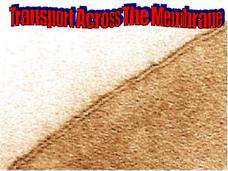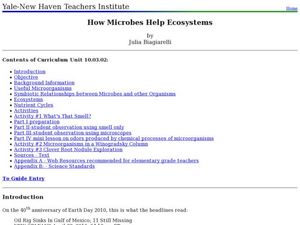Pearson
Transcription
Teach young biologists the language of life with this series of worksheets on DNA. By working through these pages, students expand their understanding of genetics as they learn about the process of transcription and the resulting mRNA...
BW Walch
Creating and Graphing Exponential Equations
Frequently found in biology and economic application problems, exponential equations show up as stars in this introductory presentation. Taking no background or knowledge of exponentials for granted, the slides walk learners through the...
Curated OER
Unit Circle and Triangle
Students apply the Unit Circle to solve ratios of triangles. In this geometry lesson, students derive the different ratios of a triangle using the Pythagorean Theorem. They find the angles of a unit circle using a right triangle.
Curated OER
"Role" Call
Students explore the positions of the members of the United Nations Security Council. They stage an enactment of a Council meeting by presenting findings to ambassadors who debate the best course of action.
Gallantsbiocorner.com
Transport Across the Membrane
Take your biology class on an exploration of the inner workings of cells with this multimedia presentation. Looking closely at the structure of cell membranes and the processes of osmosis and diffusion, this resource explains for...
Radford University
Are You Faster than Bacteria?
Just how fast does bacteria grow? Over the course of three lessons, pupils investigate exponential growth with the use of bacteria growth. During the lesson, bacteria from a cell phone is grown to make a connection to real life. Using...
Curated OER
Unit Conversion Exercises
In this unit conversion and radiation worksheet, students are given a chart with basic unit conversions for calculating radiation dosages. Students use the conversion factors to solve 7 problems.
Curated OER
Treasures in Jeopardy
In small groups, middle schoolers research deep-sea coral reefs and design a poster to educate the public about their importance. They compare them to shallow-water reefs and consider the impact of bottom-trawl fishing. Many internet...
Curated OER
Reading the River - Biological Classification
Youngsters create a list of grocery store items and then work together to categorize them as if they were setting up the shelves of the market. Then they are given a box of miscellaneous objects to practice categorizing. With these two...
Teach Engineering
Heart to Heart
Begin a unit on the heart, the parts and the function of the heart, and about heart disease with a resource that includes a lecture, a PowerPoint presentation, and research information. The lesson is the first of a four-part series and...
National Park Service
The Secret of Life
Dead trees provide nutrients for the soil, food for animals, protection and a home for organisms, a seed-bed for new trees, and a place for nitrogen-fixing bacteria to live. In the activity, pupils collect decaying logs, expose them to a...
Core Knowledge Foundation
Genetics and the Master Race
How did the beginnings of genetic research influence the Nazi party? A thorough, engaging unit incorporates the work of Gregor Mendel, the study of inherited traits, and the use of racism and discrimination during the Holocaust.
Teach Engineering
Kidney Stone Crystallization
No one likes kidney stones, but they are very interesting to learn about. The last installment of a three-part unit has learners experiment with different chemicals to see which one inhibits the growth of calcium oxalate crystals (which...
ARKive
Darwin and Natural Selection
A presentation on Darwin's theory of evolution and natural selection could be a good addition to your biology class. It provides general information about how animals adapt to their surroundings, as well as how organisms create more...
Serendip
Get the Lead Out!
Around 500,000 children under the age of six suffer from elevated levels of lead in their blood in the United States. Scholars apply their knowledge about lead to a fun game. As they correctly answer questions, they move their pieces...
Curated OER
The Marvels of Mud
Young scientists roll up their sleeves and get a little dirty in this three-day earth science investigation. Following the scientific method, children monitor the growth of algae in pond water samples in order to determine the role that...
Curated OER
Science Crossword Puzzle
Class members read 25 clues about all areas of science, including biology, chemistry, weather, physical science, and insert their answers into a crossword puzzle. There is no word bank and the students would need experience with tough...
Curated OER
Invent an Insect
Explore biology by researching adaptation. First, learners research and define a list of insect vocabulary terms and discuss the benefits of each insect characteristic. They then utilize a worksheet to create their own insect and share...
Curated OER
Classification
Tenth graders explain how organisms are classified according to similarities. In this biology lesson, 10th graders research on five different organisms of their choice. They prepare a report and presentation about them which they share...
Curated OER
Microbes in Long Island Sound
Students discover the harm and benefits of microbes. In this biology lesson, students explore water, nitrogen and carbon cycles. They investigate the factors affecting bacteria growth.
Curated OER
Cell Cycle, Mitosis and Meiosis
Seventh graders describe the processes involved in mitosis and meiosis. In this life science lesson, 7th graders create chromosome models using strings and beads. They play a jeopardy team game at the end of the unit to review concepts...
Curated OER
Ecology and Evolution
Students identify the different taxonomic classifications of organisms. In this biology lesson, students create their own organisms and make some changes according to environmental conditions. They present their work in class.
Curated OER
Ecosystems Beneath the Surface
Sixth graders create a KWL chart about microorganisms. In this biology lesson, 6th graders create and label a diagram on a microbial mat. They investigate the processes involved in the carbon, oxygen and sulfur cycles.
Curated OER
How Microbes Help Ecosystems
Sixth graders observe different microorganisms under the microscope. In this biology lesson plan, 6th graders draw and describe the samples they see. They study the root nodules of plants and explain how the plants benefit from those...

























